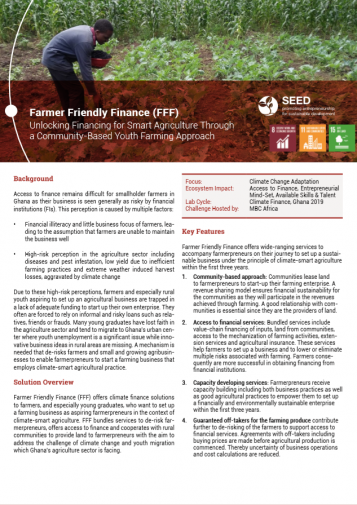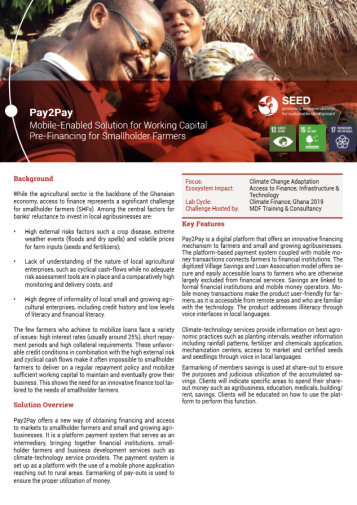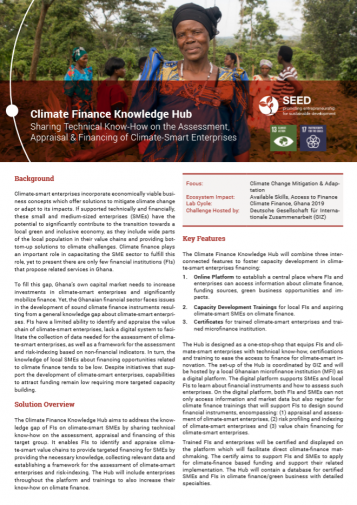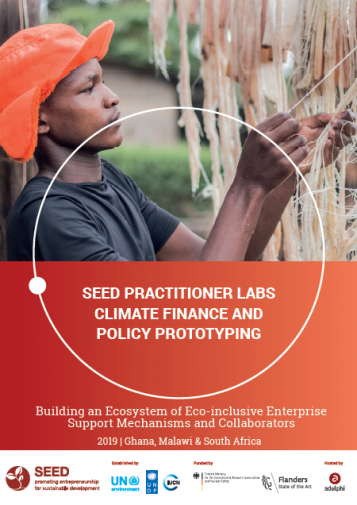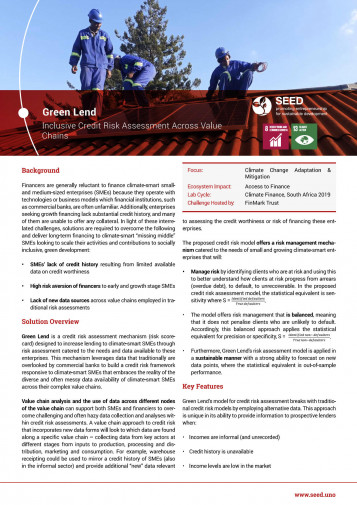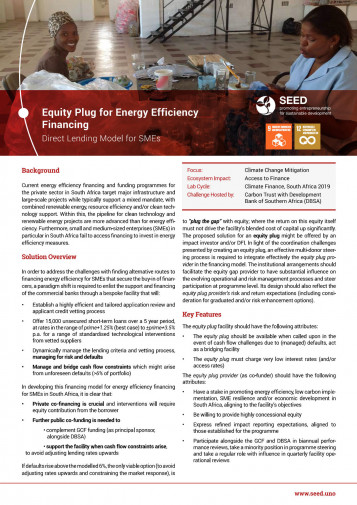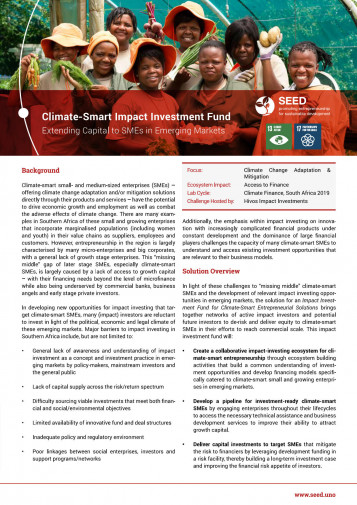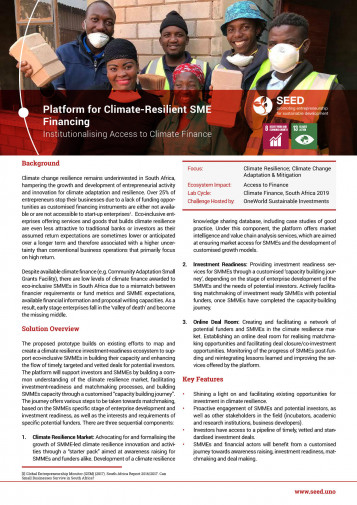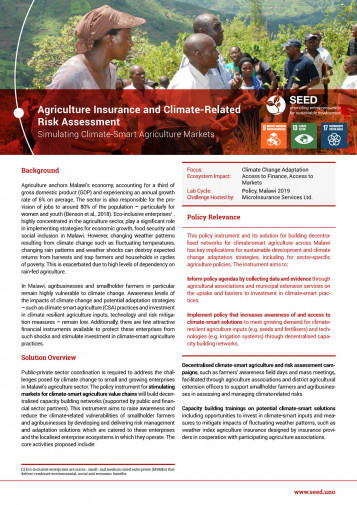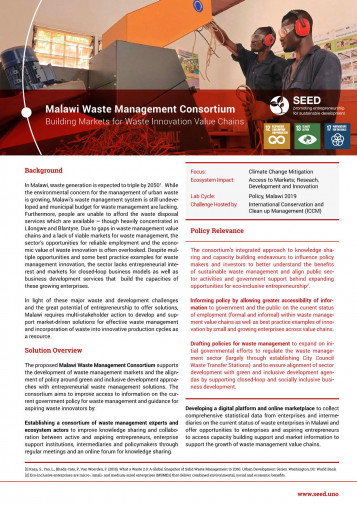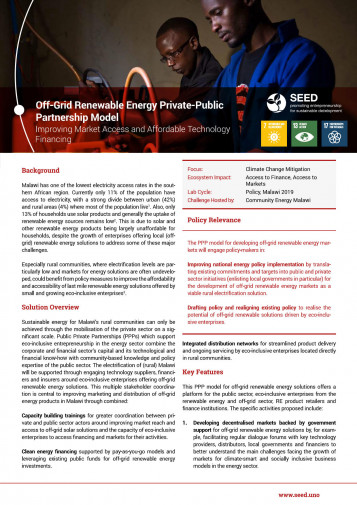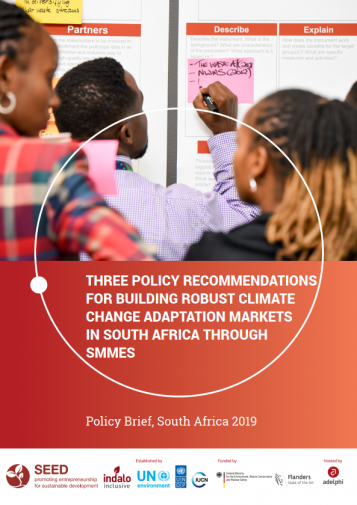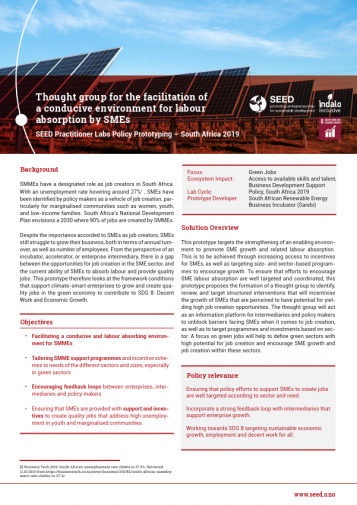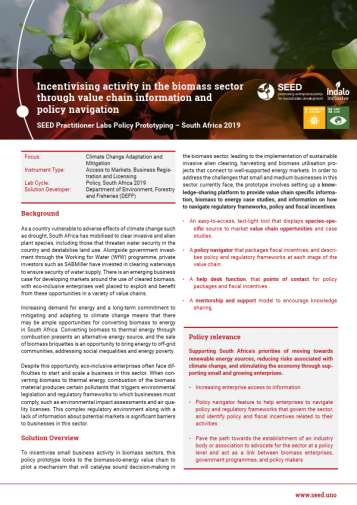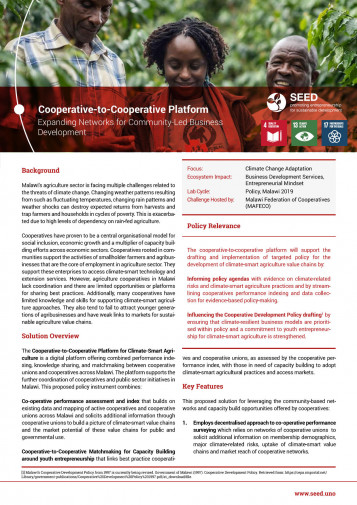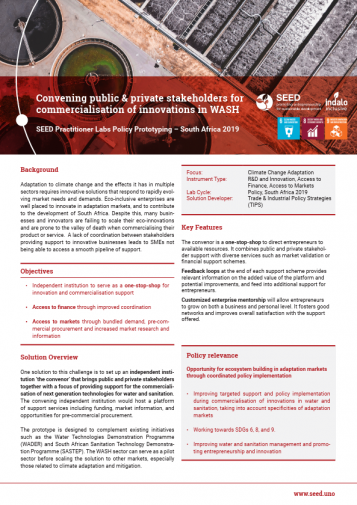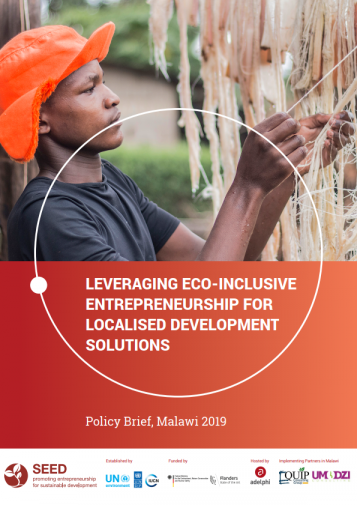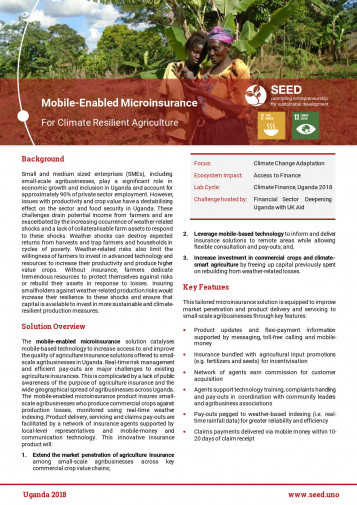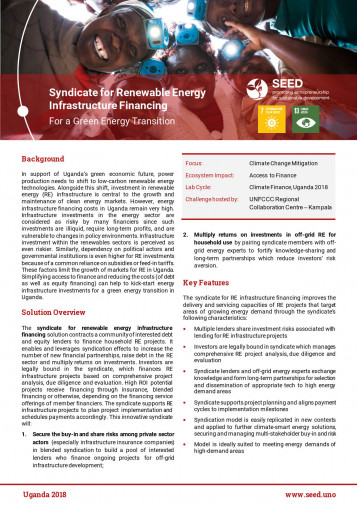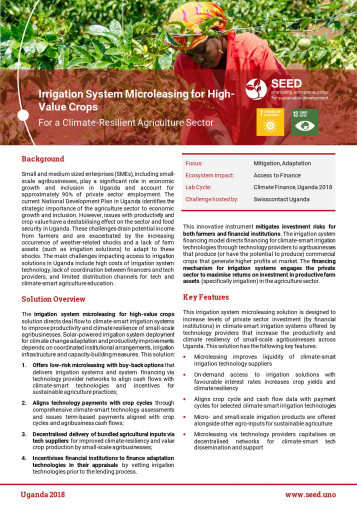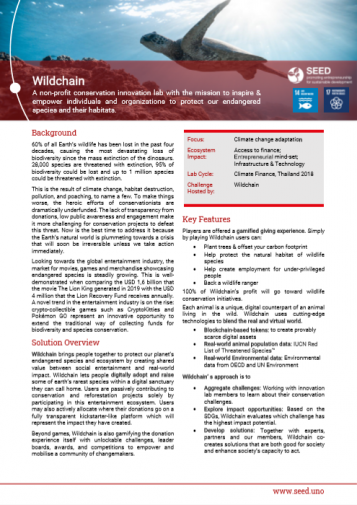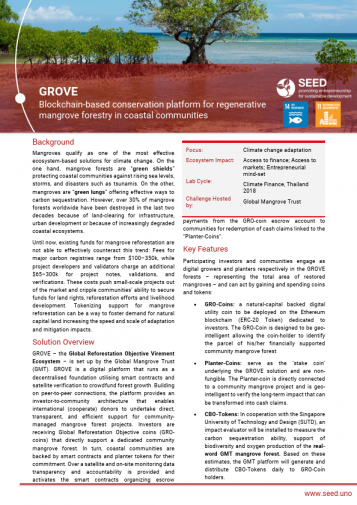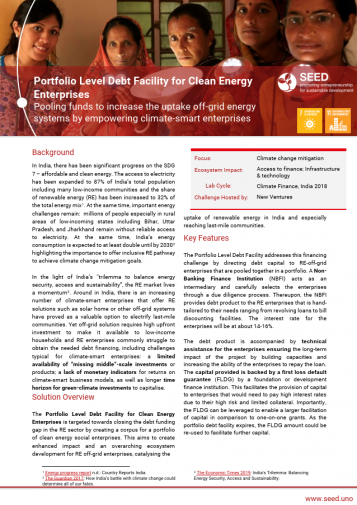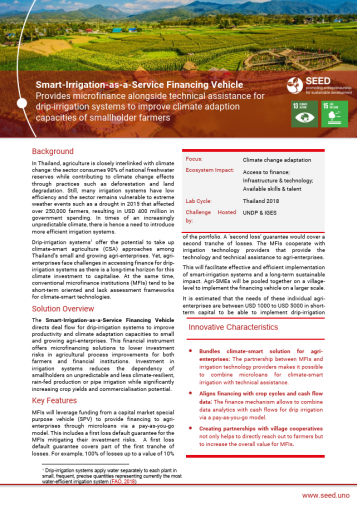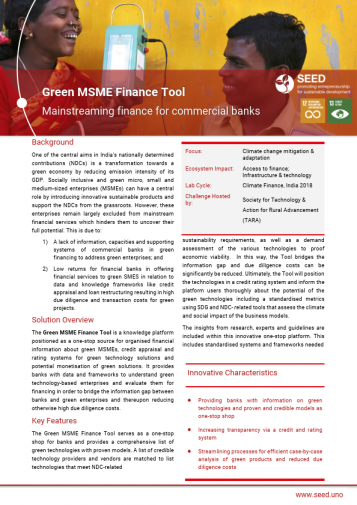Farmer Friendly Finance: Unlocking Financing for Climate-Smart Agriculture Through a Community-Based Youth Farming Approach | Climate Finance, Ghana 2019
Published: 14 January 2020 Marlena Kiefl
Farmer Friendly Finance (FFF) offers climate finance solutions to farmers, and especially young graduates, who want to set up a farming business as aspiring farmerpreneurs in the context of climate-smart agriculture. FFF bundles services to de-risk farmerpreneurs, offers access to finance and cooperates with rural communities to provide land to farmerpreneurs with the aim to address the challenge of climate change and youth migration which Ghana’s agriculture sector is facing. Read more
SDGs:



Pay2Pay: Mobile-Enabled Solution for Working Capital Pre-Financing for Smallholder Farmers | Climate Finance, Ghana 2019
Published: 14 January 2020 Kathrin Kirsch, Marlena Kiefl
Pay2Pay offers a new way of obtaining financing and access to markets to smallholder farmers and small and growing agribusinesses. It is a platform payment system that serves as an intermediary, bringing together financial institutions, smallholder farmers and business development services such as climate-technology service providers. The payment system is set up as a platform with the use of a mobile phone application reaching out to rural areas. Earmarking of pay-outs is used to ensure the proper utilization of money. Read more
SDGs:



Climate Finance Knowledge Hub: Sharing Technical Know-How on the Assessment, Appraisal & Financing of Climate-Smart Enterprise | Climate Finance, Ghana 2019
Published: 14 January 2020 Kathrin Kirsch, Marlena Kiefl
The Climate Finance Knowledge Hub aims to address the knowledge gap of FIs on climate-smart SMEs by sharing technical know-how on the assessment, appraisal and financing of this target group. It enables FIs to identify and appraise climate-smart value chains to provide targeted financing for SMEs by providing the necessary knowledge, collecting relevant data and establishing a framework for the assessment of climate-smart enterprises and risk-indexing. The Hub will include enterprises throughout the platform and training to also increase their know-how on climate finance. Read more
SDGs:



SEED Practitioner Labs 2019
Published: 25 November 2019 Alina Weiss, Camilla Shearman, Julia Haack, Kathrin Kirsch, Maggie Sloan, Marlena Kiefl
This brochure gives an overview of the 16 climate finance solutions and policy instruments developed during the 2019 SEED Practitioner Labs Climate Finance and Policy Prototyping in Ghana, Malawi, and South Africa.
This year, the labs brought together over 320 policy makers, financial institutions, civil society, research organisations, intermediaries and eco-inclusive enterprises to co-create solutions to financial and policy barriers facing eco-inclusive enterprises as they look to start and scale their ideas. Read more
This year, the labs brought together over 320 policy makers, financial institutions, civil society, research organisations, intermediaries and eco-inclusive enterprises to co-create solutions to financial and policy barriers facing eco-inclusive enterprises as they look to start and scale their ideas. Read more
SDGs:



Green Lend: Inclusive credit risk assessment across value chains | Climate Finance, South Africa 2019
Published: 24 November 2019 Maggie Sloan
This credit risk assessment mechanism aims to increase lending to climate-smart SMEs through risk scorecard development that incorporates alternative data across enterprise value chains. Read more
SDGs:



Equity plug for energy efficiency financing: Direct lending model for SMEs | Climate Finance, South Africa 2019
Published: 24 November 2019 Maggie Sloan
This model for energy efficiency financing for SMEs “plugs the gap” with equity by generating a paradigm shift in commercial banks through market, technology and supplier engagement and systematic technical assistance. Read more
SDGs:



Climate-Smart Impact Investment Fund: Extending capital to SMEs in emerging markets | Climate Finance, South Africa 2019
Published: 24 November 2019 Maggie Sloan
The solution for an Impact Investment Fund for Climate-Smart Entrepreneurial Solutions brings together networks of active impact investors and potential future investors to deliver equity to climate-smart SMEs in their efforts to reach commercial scale. Read more
SDGs:



Platform for climate-resilient SME financing: Institutionalising access to climate finance | Climate Finance, South Africa 2019
Published: 24 November 2019 Julia Haack, Maggie Sloan
The platform will build on existing infrastructure to support investors and SMMEs by building a common understanding of the climate resilience market, facilitating investment-readiness and deal flow matchmaking processes, while building SMMEs’ capacity through a customised “capacity building journey”. Read more
SDGs:



Agriculture Insurance and Climate-Related Risk Assessment: Stimulating Climate-Smart Agriculture Markets | Policy, Malawi 2019
Published: 13 November 2019 Alina Weiss, Maggie Sloan, Marlena Kiefl
The policy instrument for stimulating markets for climate-smart agriculture value chains, combining agriculture insurance and climate-related risk assessment, will build decentralised capacity-building networks (supported by public and financial sector partners). This instrument aims to raise awareness and reduce the climate-related vulnerabilities of smallholder farmers and agribusinesses by developing and delivering risk management and adaptation solutions which are catered to these enterprises and the localised enterprise ecosystems in which they operate. Read more
SDGs:





Malawi Waste Management Consortium: Building markets for waste innovation value chains | Policy, Malawi 2019
Published: 13 November 2019 Alina Weiss, Maggie Sloan, Marlena Kiefl
The Malawi Waste Management Consortium supports the development of waste management markets and the alignment of policy around green and inclusive development approaches with entrepreneurial waste management solutions. The consortium aims to improve access to information on the current government policy for waste management and guidance for aspiring waste innovators by establishing a consortium of waste management experts and ecosystem actors and developing a digital platform and online marketplace for waste innovation. Read more
SDGs:





Off-grid renewable energy private-public partnership model: Improving market access and affordable technology financing | Policy, Malawi 2019
Published: 13 November 2019 Alina Weiss, Maggie Sloan, Marlena Kiefl
his private-public partnership model furthers the electrification of (rural) Malawi by engaging technology suppliers, financiers and government around eco-inclusive enterprises offering off-grid renewable energy solutions and delivering capacity building for integrated distribution networks and targeted clean energy financing solutions. Read more
SDGs:





Three policy recommendations for building robust climate change adaptation markets in South Africa
Published: 28 October 2019 Camilla Shearman, Christine Meyer, Sonya Ong
With lessons drawn from an 8-month policy prototyping labs cycle in South Africa and over fifteen years of enterprise support, this policy brief presents three recommendations for policymakers to improve SMME access and contribution to climate change adaptation markets. These recommendations include (1) increasing availability of and access to market information, (2) creating support pipelines between public and private stakeholders, and (3) leveraging intermediaries as key contributors to the implementation and evaluation of market access policies. Read more
SDGs:







Building a conducive environment for SME labour absorption | Policy, South Africa 2019
Published: 21 October 2019 Camilla Shearman, Julia Haack
This policy instrument targets the strengthening of an enabling environment to promote SME growth and related labour absorption. This is to be achieved through increasing access to incentives for SMEs, as well as targeting size- and sector-based programmes to encourage growth. The thought group will act as an information platform for intermediaries and policy makers to unblock barriers facing SMEs when it comes to job creation, as well as to target programmes and investments based on sector. A focus on green jobs will help to define green sectors with high potential for job creation and encourage SME growth and job creation within these sectors . Read more
SDGs:

Incentivising activity in the biomass sector | Policy, South Africa 2019
Published: 21 October 2019 Camilla Shearman, Julia Haack
This policy prototype looks to the biomass-to-energy value chain to pilot a mechanism that will catalyse sound decision-making in the biomass sector, leading to the implementation of sustainable invasive alien clearing, harvesting and biomass utilisation projects that connect to well-supported energy markets. In order to address the challenges that small and medium businesses in this sector currently face, the prototype involves setting up a knowledge-sharing platform to provide value chain specific information, biomass to energy case studies, and information on how to navigate regulatory frameworks, policy and fiscal incentives. Read more
SDGs:





Cooperative-to-Cooperative Platform: Expanding networks for community-led business development | Policy, Malawi 2019
Published: 21 October 2019 Alina Weiss, Maggie Sloan, Marlena Kiefl
The cooperative-to-cooperative platform for climate-smart agriculture is a digital platform offering combined performance indexing, knowledge sharing, and matchmaking between cooperative unions and cooperatives across Malawi. The platform supports the further coordination of cooperatives and public sector initiatives in Malawi. Read more
SDGs:





Commercialisation of climate change adaptation innovations | Policy, South Africa 2019
Published: 21 October 2019 Camilla Shearman, Julia Haack
The proposed independent institution brings public and private stakeholders together with a focus of providing support for the commercialisation of climate change adaptation technologies. The convening independent institution would host a platform of support services including funding, market information, and opportunities for pre-commercial procurement. The solution will therefore act as a “one stop shop” for SMEs during commercialisation. Read more
SDGs:





Leveraging eco-inclusive entrepreneurship for localised development solutions | Policy Brief Malawi
Published: 21 October 2019 Camilla Shearman, Christine Meyer, Maggie Sloan, Marlena Kiefl
In a global context of commitments to sustainable development and the mitigation of and adaptation to climate change, Malawi has set out ambitious agendas to increase resilience to climate change and move towards a green and inclusive economy. Translating these ambitious agendas into impact at the community level requires concerted efforts in the decentralisation of policy initiatives and capacity building of local actors. SMMEs play a key role in aligning local markets to national development goals, and can have a transformational impact on the achievement of these goals. Drawing on discussions from the SEED policy dialogue and labs process in Malawi, this policy brief presents recommendations to policy makers for leveraging the potential of SMMEs to transform the agriculture, waste, and clean energy sectors in Malawi, and across Southern Africa. Read more
SDGs:



Mobile-Enabled Microinsurance for Climate Resilient Agriculture | Climate Finance, Uganda 2018
Published: 09 July 2019 Alina Weiss, Maggie Sloan
The mobile-enabled microinsurance solution catalyses mobile-based technology to increase access to and improve the quality of agriculture insurance solutions offered to small-scale agribusinesses in Uganda. This product insures small-scale agribusinesses who produce commercial crops against production losses, monitored using real-time weather indexing. Product delivery, servicing and claims pay-outs are facilitated by a network of insurance agents supported by local-level representatives and mobile-money and communication technology. Read more
SDGs:



Syndicate for Renewable Energy Infrastructure Financing | Climate Finance, Uganda 2018
Published: 09 July 2019 Alina Weiss, Maggie Sloan
The syndicate for renewable energy infrastructure financing solution contracts a community of interested debt and equity lenders to finance household RE projects. It enables and leverages syndication effects to increase the number of new financial partnerships, raise debt in the RE sector and multiply returns on investments. Investors are legally bound in the syndicate, which finances RE infrastructure projects based on comprehensive project analysis, due diligence and evaluation. High ROI potential projects receive financing through insurance, blended financing or otherwise, depending on the financing service offerings of member financiers. The syndicate supports RE infrastructure projects to plan project implementation and schedules payments accordingly. Read more
SDGs:



Irrigation System Microleasing for High-Value Crops | Climate Finance, Uganda 2018
Published: 08 July 2019 Alina Weiss, Maggie Sloan
The irrigation system microleasing for high-value crops solution mitigates investment risks for both farmers and financial institutions. The irrigation system financing model directs financing for climate-smart irrigation technologies through technology providers to agribusinesses that produce (or have the potential to produce) commercial crops that generate higher profits at market. The financing mechanism for irrigation systems engages the private sector to maximise returns on investment in productive farm assets (specifically irrigation) in the agriculture sector. Read more
SDGs:



Wildchain: A Non-profit Conservation Innovation Lab | Climate Finance, Thailand 2018
Published: 20 December 2018 Kathrin Kirsch, Marlena Kiefl
Wildchain brings people together to protect our planet’s endangered species and ecosystem by creating shared value between social entertainment and real-world impact. Wildchain lets people digitally adopt and raise some of earth’s rarest species within a digital sanctuary they can call home. Users are passively contributing to conservation and reforestation projects solely by participating in this entertainment ecosystem. Users may also actively allocate where their donations go on a fully transparent kickstarter-like platform which will represent the impact they have created. Read more
SDGs:







GROVE: Blockchain-based conservation plaform for regenerative mangrove forestry | Climate Finance, Thailand 2018
Published: 20 December 2018 Kathrin Kirsch
GROVE – the Global Reforestation Objective Virement Ecosystem – is set up by the Global Mangrove Trust (GMT). GROVE is a digital platform that runs as a decentralised foundation utilising smart contracts and satellite verification to crowdfund forest growth. Read more
SDGs:



New Ventures: Portfolio Level Debt Facility for Clean Energy | Climate Finance, India 2018
Published: 20 December 2018 Kathrin Kirsch
The Portfolio Level Debt Facility for Clean Energy Enterprises is targeted towards closing the debt funding gap in the RE sector by creating a corpus for a portfolio of clean energy social enterprises. This aims to create enhanced impact and an overarching ecosystem development for RE off-grid enterprises, catalysing the
uptake of renewable energy in India and especially reaching last-mile communities. Read more
uptake of renewable energy in India and especially reaching last-mile communities. Read more
SDGs:

Smart-Irrigation-as-a-Service Financing Vehicle | Climate Finance, Thailand 2018
Published: 20 December 2018 Kathrin Kirsch
The Smart-Irrigation-as-a-Service Financing Vehicle directs deal flow for drip-irrigation systems to improve productivity and climate adaptation capacities to small and growing agri-enterprises. This financial instrument offers microfinancing solutions to lower investment risks in agricultural process improvements for both farmers and financial institutions. Read more
SDGs:





TARA: Green SME Finance Tool | Climate Finance, India 2018
Published: 20 December 2018 Kathrin Kirsch
The Green MSME Finance Tool is a knowledge platform positioned as a one-stop source for organised financial information about green MSMEs, credit appraisal and rating systems for green technology solutions and potential monetisation of green solutions. It provides banks with data and frameworks to understand green technology-based enterprises and evaluate them for financing in order to bridge the information gap between banks and green enterprises and thereupon reducing otherwise high due diligence costs. Read more
SDGs:




